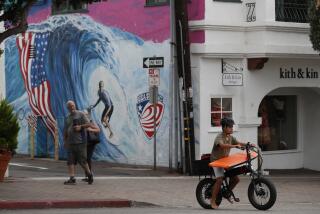Sunday Events Fall Short of Heavenly Bliss
FREDERICK, Md. — Pealing bells are at odds with pounding feet in the city of clustered spires.
Supporters say the Frederick Marathon showcases this picturesque community, which features five downtown steeples on its seal.
But some churches say street closures during last year’s inaugural race reduced attendance at Sunday morning services by as much as 25%. Their opposition to a repeat performance has grown so heated that one pastor likened it to a war.
Still, the marathon is scheduled for a Sunday morning, May 2.
As organizers prepare for it, and for two other Sunday events this year that will bring thousands of visitors downtown, the ministers are using their ecumenical clout to force compromises.
“I don’t want to be crass about it, but we have a business too,” said the Rev. John Morehouse, president of the Frederick Area Ministerial Assn. “Frederick wouldn’t have the ambience it has if it didn’t have its churches.”
Since the association raised its voice in a letter to Mayor Jennifer P. Dougherty in November, the city and volunteer marathon committee have announced changes to the race time and route, along with plans for staggered street closures and other measures to reduce driver backups.
Morehouse, a Unitarian Universalist minister, said the changes are recognition that churches foster “a strong sense of community and a strong sense of meaning in people’s lives.”
But some ministers aren’t comforted by the concessions.
The Rev. Robert Manthey, pastor of the downtown Calvary United Methodist Church, said the marathon still will disrupt traffic to and from church. Furthermore, the annual Frederick Festival of the Arts, scheduled for the first weekend in June, aims to move next year from a downtown park to the downtown streets.
And then there’s July 4, perhaps the biggest annual downtown event. It falls on a Sunday this year and is sure to involve street closures.
“It grows,” Manthey said. “First it’s one Sunday, now two Sundays, now three Sundays. Unless we do something about it, we’re going to feel that impact more and more.”
The churches are undeniably important to the city’s image. There are 15 houses of worship downtown, averaging one every other block in the historic district. Poet John Greenleaf Whittier described “the clustered spires of Frederick” in his 1863 ballad, “Barbara Fritchie.”
For more than 200 years, the city 45 miles from Washington served mainly as the Frederick County seat, the center of government, commerce and worship for conservative farm families. But an influx of commuters and high-tech industry in recent decades has brought the coffee-fueled, time-crunched, fun-seeking realities of modern life to the town of 53,000.
“I think the city reflects the changing character of our nation,” Manthey said. “We’re a microcosm of what’s happening, where faith issues -- the sacred -- don’t have the priority they had at one time.”
The Rev. Paul Mundey, senior pastor of Frederick Church of the Brethren, lamented the repealing of “blue laws,” which prohibited commerce on Sundays. He said he was disappointed that city officials recently attended a Sunday grand opening of a new Boscov’s department store.
“The overarching issue is the feeling of being marginalized,” he said. “The impression or the inference is that we’re pushovers.”
Mundey said Frederick ministers historically have avoided confrontation and politics: “We normally are trying to advocate a non-antagonistic approach, but we’re being kind of forced into this role.”
The Rev. Ginger Memmott, fiery pastor of Frederick Presbyterian Church, said ministers are crippled by their conciliatory mentality. She was incensed by the marathon committee’s request for a preacher to lead the expected 2,000 runners in prayer before the race. “I remember Vietnam, when we were asked to bless the bombs before they went on the airplanes,” she said.
The prayer will be led by the Rev. Joseph R. Foster of Grace United Church of Christ, the ministers’ liaison to the marathon committee.
“I’ve always been one to move away from confrontation to cooperation as much as possible,” he said.
Businessman Eric Fairbanks, a practicing Roman Catholic and long-distance runner who chairs the marathon committee, said the dispute has opened a dialogue about the community’s evolution, “and it took an event this size for everyone to start to notice its impact.”
Dougherty acknowledged the churches’ essential role in the community -- but she said everybody has to give a little.
“Nobody’s trying to take away the importance of Sunday morning, but there is a level of cooperation and flexibility that is required in this day and age,” the mayor said. “There aren’t blue laws any more. People work on Sundays.”
More to Read
Sign up for Essential California
The most important California stories and recommendations in your inbox every morning.
You may occasionally receive promotional content from the Los Angeles Times.










